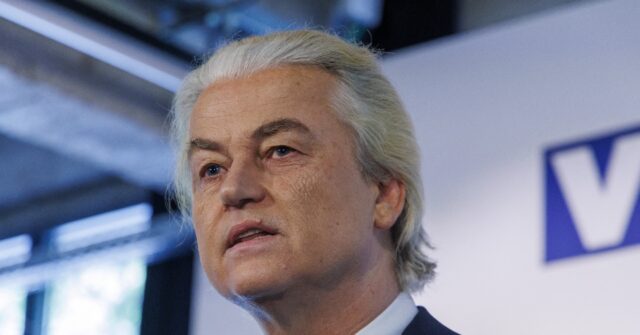Far-left extremists recently took responsibility for a death threat issued against Geert Wilders, the leader of the Dutch populist Party for Freedom (PVV), marked by an effigy displayed in a public setting. This incident, which transpired in the city of Dokkum, featured a mannequin resembling Wilders hanging by a noose, prompting fresh concerns over the safety of political figures in the Netherlands. Wilders has faced a barrage of threats over the last two decades, primarily due to his outspoken opposition to radical Islam and his vocal stance advocating for the end of what he perceives as the Islamification of Europe.
The unsettling display included an effigy adorned with a T-shirt emblazoned with the PVV’s initials and a wig reminiscent of Wilders’ hairstyle. The effigy was hung near the chapel dedicated to St. Boniface, a location steeped in historical significance, as it marks where the saint was reportedly murdered in 754 AD by Frisian bandits. Displayed alongside the effigy was a banner that likened the PVV to the infamous National Socialist Movement in the Netherlands (NSB) from World War II, insinuating a direct connection between Wilders’ party and fascism. The message on the banner declared, “THIS IS HOW FASCISTS END,” amplifying the threatening tone of the act.
In a statement released on the far-left anarchist platform Indymedia, the attackers described their actions and expressed their intent to combat what they termed as modern fascism represented by Wilders and his party. They proclaimed that the PVV is “a modern fascist and undemocratic political party that must be fought root and branch,” indicating a fervent commitment to opposing their political ideology. This incident, characterized by its shocking nature, reflects the intense polarization surrounding Wilders’ political career and the increasingly hostile atmosphere for right-wing politicians in Europe.
Wilders responded to the grim display by expressing his disgust on social media, noting, “Geert Wilders on the rope… Too sick for words.” His emotional response underscores the chilling reality faced by politicians who challenge the status quo, particularly those who take controversial stances such as Wilders. The incident also resonates on a personal level for Wilders, recalling a tumultuous history of threats he has endured since he first rose to prominence. The leader has been under constant police protection, a reality that signifies how dangerous the political climate has become, especially for those who oppose radical ideologies.
This incident comes at a poignant moment, marking nearly 20 years since Wilders and his wife were forcibly removed from their home due to credible death threats stemming from radical Islamist groups. Since then, they have lived under tight security measures and in various safe houses, highlighting the ongoing reality of violence against political figures in the Netherlands. As the leader of the PVV, which has a significant role in the current coalition government, his determination to fight for the freedoms of the Dutch people remains steadfast, despite the ominous threats he faces. Wilders’ commitment to his cause is exemplified in his reflection on this anniversary, stating, “I fight for the freedom of the Dutch every day because I know how bad not having freedom is.”
The ramifications of such threats extend beyond Wilders as they raise pressing questions regarding the broader political landscape in the Netherlands and across Europe. The incident illustrates a growing trend of political violence and intimidation, particularly directed at populist leaders who challenge conventional political narratives. As societal divisions deepen, incidents like this highlight the urgent need for addressing political polarization and ensuring the safety of public figures regardless of their political alignment. The muted response from the Dutch establishment media regarding this latest threat adds another layer of complexity to the discourse on political accountability and media responsibility in the face of rising extremism.
Overall, this episode serves as a stark reminder of the challenges faced by modern democracies in navigating the turbulent waters of political dissent and extremism. It raises critical conversations about freedom of expression, the limits of political activism, and the measures necessary to protect those who speak out against radical ideologies. In the context of an increasingly volatile political environment, understanding the implications of threats against leaders like Geert Wilders is essential to fostering a healthier democratic dialogue and ensuring that freedom of speech remains intact in the face of adversity.

